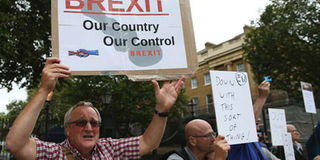Who do you trust? Poll puts politicians at the bottom and nurses at the very top

A man carrying an anti-EU placard protests at Parliament Square in London on September 3, 2016. PHOTO | AFP
What you need to know:
- It will come as no surprise in this country that politicians came dead last, being trusted by only 15 per cent of people polled.
- Regularly maligned lawyers registered a mid-table placing with 52 per cent, while newsreaders were given 67 per cent.
In less than two weeks we Brits can say goodbye and good riddance to 2016 with its stupid Brexit, its hostility to migrants, its shilly-shallying politicians, its biased newspapers and its out-of-control and frequently vicious social media.
In such a climate, the concept of trust takes a beating, and this has been vividly demonstrated in the Ipsos Mori 2016 Veracity Index, an annual assessment of which professions British people trust and which they don’t.
Twenty-four job roles were surveyed, from hairdressers to TV newsreaders, economists to estate agents.
It will come as no surprise in this country that politicians came dead last, being trusted by only 15 per cent of people polled.
This was worse than last year, by 6 per cent, but hardly surprising, given the turmoil of the June referendum and the move to quit Europe.
Polling just before the referendum found that 46 per cent of people thought politicians from both the Remain and Leave campaigns were telling lies.
More trust was accorded to MPs who stuck to their views, pro or con, than to those perceived to be sitting on the fence or not sincere.
Some sympathy for the politicians was expressed by experts, however, with one saying, “It is difficult to be straightforward, honest and transparent – key components of trust – while simultaneously obeying your party line”.
Many people said they believed that news outlets were biased in their coverage of the Europe campaign and this presumably helped maintain the media’s position as second bottom, trusted by only 24 per cent of those polled.
Regularly maligned lawyers registered a mid-table placing with 52 per cent, while newsreaders were given 67 per cent.
TOPPING LIST
Higher up the table, the police, who have had bad years in the past, climbed to 71 per cent trustworthy, while priests and clergy dropped from a high of 85 per cent in 1983 to 69 per cent today.
Experts blamed increasing secularisation and sexual abuse cases involving churchmen.
Teachers were not quite top of the class, but 88 per cent of people trust them and voted them into second place, just behind those ladies we all have a soft spot for – nurses, overall winners at 93 per cent.
***
If we don’t trust politicians to run the country properly, maybe we should hand the job over to motorcycle thieves.
An ex-journalist blogger told recently how a friend, the proud owner of a 1200cc BMW, happened to look out of his office window and saw four men around his bike.
He raced downstairs only to find the thieves had jammed the front door.
At the back door, they fought him off with an iron bar, then roared off with his machine, which was equipped with what was supposed to be an unbreakable immobilising device.
However, the bike also had a tracking gizmo and the owner telephoned the police.
Thirty minutes later, the tracker led the cops to a housing estate in Paddington, London.
There, ripped off, was the tracking device. The motorbike was gone.
The bike owner said the manufacturer’s engineers take an hour to dismantle the tracking device. The thieves did it in 20 minutes.
Police said the bike was probably stolen to order and sold abroad for £20,000 (Sh2.6 million).
The thieves would have got around £5,000 (Sh648,000).
***
The number of young people in the UK seeking help for anxiety has increased sharply, according to the charity Childline, from 8,642 in 2014 to 11,706 last year.
That doesn’t surprise me because the means of communications have multiplied and children are entirely at home with mobile phones, tablets, Twitter and the rest.
What is surprising is what some of the children are worried about.
As to be expected, there are personal and family problems, but there are also young folk, it seems, who fret about Britain’s decision to pull out of Europe, about the American election and the war in Syria.
Esther Rantzen, who started Childline, said young people are sometimes distressed by world events.
She said, "Seeing pictures of crying toddlers being pulled from bombed houses upsets all of us.
"Often we fail to notice the impact these stories are having on young people."
I see what she means. I often have to resist the impulse to turn off the news and watch Planet Earth II or the cartoons instead.
***
Santa Claus was in his grotto in the big store and an excited little girl went to visit him.
“And what would you like for Christmas?” Santa asked. She looked at him in astonishment. “Didn’t you get my e-mail?”
Two drunks take the train to go see England play football.
The following conversation ensued: Is this Wembley? No, it’s Thursday. So am I, let’s go for another drink.





